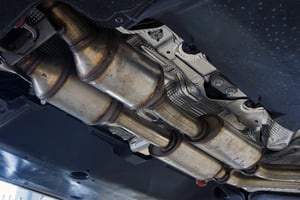
Beyond Sales: Record-Keeping and Compliance for Catalytic Converters
In response to increasing catalytic converter thefts, New Hampshire enacted Senate Bill 188-FN on August 4, 2023. This legislation introduced specific guidelines and mandatory practices designed to create a clear and transparent tracking system for catalytic converter sales.
PARTNER SPOTLIGHT
Dealer Management System, Computer Technology, Media/Advertising, Automotive Auction, F & I/Aftermarket Products, Automotive Technology Training & Compliance
 A NHADA Gold PARTNER
A NHADA Gold PARTNERComputer Technology, Automotive Shop Equipment, Environmental Services
 A NHADA Platinum PARTNER
A NHADA Platinum PARTNERF & I/Aftermarket Products, Automotive Technology Training & Compliance, Environmental Services
.png?width=150&name=corp_logo_horz_on_light_with_trademark_symbol_1200w%20(002).png) A NHADA Diamond PARTNER
A NHADA Diamond PARTNERKey Requirements of Senate Bill 188-FN:
1. Record-Keeping Requirements: Licensed junk and scrap metal dealers must maintain accurate, detailed records for every catalytic converter transaction. Records should include:- Seller's valid identification information.
- The make, model, and year of the vehicle from which the catalytic converter was removed.
- The date and details of the transaction.
3. Cooperation with Law Enforcement: Dealers are required to cooperate fully with law enforcement officials. This includes promptly providing access to records and relevant information during theft investigations, thereby aiding in identifying and prosecuting individuals involved in illegal activities related to catalytic converters.
Recommended Best Practices:
- Implement Robust Documentation Procedures: Establish consistent and thorough documentation practices within your facility. Digital record-keeping is highly recommended for ease of retrieval and accuracy.
- Regular Staff Training: Educate your team on the importance of accurate record-keeping and the legal implications of Senate Bill 188-FN. Ensure staff members understand how to properly verify seller identification and vehicle information.
- Secure Storage: Maintain organized, secure storage of catalytic converters awaiting sale or recycling. Secure storage reduces risks associated with theft and unauthorized transactions.
- Regular Audits: Conduct periodic internal audits to confirm adherence to documentation and compliance standards mandated by Senate Bill 188-FN.
These measures established by Senate Bill 188-FN are designed to deter catalytic converter theft, enhance transparency in transactions, and support law enforcement efforts across New Hampshire. By following these best practices, auto dealers and recyclers can actively contribute to reducing catalytic converter theft and promote a safer business environment.


















.png?width=150&name=Ally_Final%20Logos%20and%20Pairings_11.14.2018-01%20(2).png)


-2.png?width=150&name=Wipfli%20Logo%20Blue%20RGB%20(1)-2.png)


.jpg?width=150&name=NHADA_Partner_FTR_Img_NHADA_Insurance%20(1).jpg)


.jpg?width=150&name=NHADA_Partner_FTR_Img_JMA(1).jpg)


